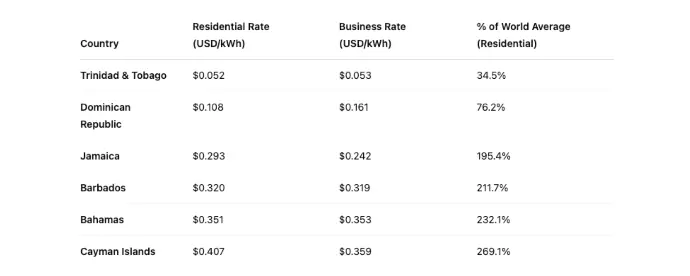The Caribbean is at a turning point. Long cast as a climate-vulnerable region dependent on imported fossil fuels, we are in fact rich in untapped solar and wind resources. Yet despite year-round sunshine and consistent coastal breezes, our nations pay some of the world’s highest electricity costs. This dependence on oil drains public coffers, exposes us to price shocks, and traps us in a cycle of economic fragility. Climate finance, meanwhile, often arrives late, misallocated, or wrapped in bureaucracy. What we face is not just an energy crisis but a leadership gap.

*Note: World average residential electricity price is approximately $0.154 per kWh.*
To break the cycle, we must adopt a new climate finance model that is transparent, tech-enabled, and trustless. Every grant, contract, and output must be verifiable—using blockchain to trace funding and ensure impact. Artificial intelligence and IoT can power smart grids, manage outages, and guide maintenance in real time. Infrastructure can be financed through consignment-based models, where solar panels and turbines are sourced from manufacturers and paid off over time via blockchain microtransactions—tied to actual energy output and tracked through IoT systems. A regional digital Caribbean rupee, integrated into a local adaptation of India Stack, could underpin seamless identity, payments, and data management—empowering communities and automating accountability.
The Caribbean has the potential to become a net exporter of clean power. Projects like the Southern Caribbean Fiber and Energy Cable—a proposed HVDC submarine link between Trinidad, Barbados, and Guyana—are laying the groundwork. HVDC cables, already used across Europe and Asia, transmit large volumes of electricity with minimal loss over long distances. Paired with hurricane-resilient routing informed by satellite imagery and storm modeling, these cables could safely link Caribbean grids to each other—and to Florida and the Gulf Coast.
A Caribbean Energy Alliance could oversee the rollout: setting grid standards, pooling funds, and coordinating infrastructure. This regional body—perhaps modeled on CARICOM’s CSME—could unlock the scale needed to attract green investment and ensure that energy exports benefit all.
The Eastern Caribbean offers a logical starting point. Islands like Dominica, St. Lucia, Grenada, and St. Vincent have high solar and wind potential, along with compact grids ideal for HVDC integration and smart microgrid development.
Imagine these islands powered by solar panels installed by local technicians, sourced through consignment from global manufacturers. Payments flow back to suppliers in microtransactions through blockchain as energy is produced. Everything is traceable. No middlemen. No waste. Just smart, scalable infrastructure.
Cheaper electricity isn’t just good economics—it’s liberation. It frees household budgets, allows businesses to scale, and keeps schools and hospitals running without interruption. It attracts investment, spurs local manufacturing, and supports new industries like AI, software development, and digital services. Most importantly, it returns power—literally and figuratively—to the people.
This is our Wakanda moment. Not one built on myth, but on code, cables, and community. A chance to define ourselves not as climate victims, but climate leaders. Not as markets to be helped, but partners with something to offer.
More here: The Politics of Energy Blockchain: Decentralizing Power in the Global South

About the Author
Ken Fontius is a blockchain and digital currency specialist with eight years of intensive research in distributed ledger technologies, digital identity solutions, and stable coin development. His focus has been on creating trusted digital currency systems that offer stability rather than the volatility typically associated with cryptocurrencies.
